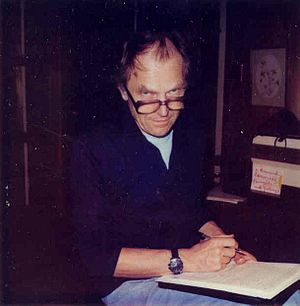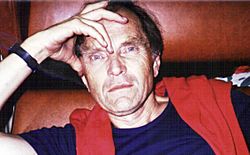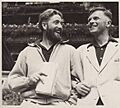Paul Feyerabend facts for kids
Quick facts for kids
Paul Feyerabend
|
|
|---|---|

Feyerabend at Berkeley
|
|
| Born | January 13, 1924 |
| Died | February 11, 1994 (aged 70) |
| Education | University of Vienna (PhD, 1951) |
| Era | 20th-century philosophy |
| Region | Western philosophy |
| School | Analytic philosophy |
| Institutions | University of California, Berkeley; ETHZurich |
| Thesis | Zur Theorie der Basissätze (A Theory of Basic Statements) (1951) |
| Doctoral advisor | Victor Kraft |
| Other academic advisors | Karl Popper Arthur Pap |
| Doctoral students | Nancey Murphy |
|
Main interests
|
Philosophy of science, epistemology, political philosophy, ancient philosophy, philosophy of mind |
|
Notable ideas
|
Epistemological anarchism Criticism of falsificationism Incommensurability eliminative materialism |
|
Influences
|
|
Paul Karl Feyerabend (January 13, 1924 – February 11, 1994) was an Austrian philosopher. He is best known for his ideas about the philosophy of science, which is the study of how science works and what makes it special.
Feyerabend taught at the University of Bristol and then for many years at the University of California, Berkeley. He also taught at other famous universities like University College London and the London School of Economics.
His most famous book is Against Method (1975). In this book, he argued that there are no strict, universal rules that scientists must follow. He believed that science often progresses by breaking rules. He also wrote about how science connects with society in his book Science in a Free Society (1978).
Feyerabend is seen as one of the most important philosophers of science from the 20th century. He is often mentioned with other key thinkers like Thomas Kuhn. His ideas about allowing many different scientific approaches (called scientific pluralism) have been very important. He was known for his unique and sometimes rebellious personality.
In 2006, the Paul K. Feyerabend Foundation was created in his honor. This foundation helps disadvantaged communities and promotes human rights and cultural diversity. An asteroid, (22356) Feyerabend, is also named after him.
Contents
Paul Feyerabend's Life Story
Early Years in Vienna
Paul Feyerabend was born in Vienna, Austria, in 1924. His family lived in a lively working-class neighborhood. He remembered his childhood as a mix of everyday life and mysterious, magical events. This idea, that a small change in how you look at things can make the ordinary seem magical, later appeared in his philosophical work.
He went to a good high school where he was a top student, especially in physics and mathematics. When he was 13, he built his own telescope and became an observer for a solar research institute. He loved reading adventure novels and plays. He discovered philosophy through books by Plato and Descartes. He also became very interested in singing and opera.
World War II and Its Impact
During World War II, Feyerabend was drafted into the German working service in 1942. He described this work as boring. He later volunteered for officer school, hoping the war would end soon. This did not happen.
From 1943, he served as an officer on the Eastern Front. He was awarded an Iron cross and became a lieutenant. He was shot three times while directing traffic, with one bullet hitting his spine. This injury left him in a wheelchair for a year and caused partial paralysis for the rest of his life. He learned to walk with a crutch but often suffered from severe pain.
After the war, Feyerabend recovered in a hospital. He worked in public entertainment, writing speeches and plays. He also studied music and joined a cultural association.
University Studies and Early Career
Feyerabend returned to Vienna and studied at the University of Vienna. He first wanted to study physics and math but chose history and sociology to understand his wartime experiences better. He soon switched back to physics, studying astronomy and other sciences. He also continued his singing lessons.
In 1948, he met the famous philosopher Karl Popper, who impressed him. Feyerabend also met Ludwig Wittgenstein, another very important philosopher. He traveled in Europe, talking with many philosophers and scientists, including Niels Bohr.
In 1951, he earned his PhD with a thesis on "basic statements." In 1952, he continued his studies in London, focusing on quantum mechanics and Wittgenstein's ideas. He also attended Popper's lectures. During this time, he started developing his idea of "incommensurability," which means that some scientific theories are so different they can't be directly compared.
In 1955, Feyerabend began his academic career as a lecturer at the University of Bristol. He later moved to the University of California, Berkeley, in 1958, which became his main academic home.
Life in Berkeley and Zurich
At Berkeley, Feyerabend taught philosophy and philosophy of science. He was known for inviting students and even famous outsiders like Malcolm X to speak on various topics, including gay rights and racism. He supported students but not student strikes.
He often accepted teaching positions at other universities while still at Berkeley. He found some of these experiences boring, feeling that many people lacked their own ideas. He even asked his undergraduate students to build useful things like furniture or short films instead of writing papers.
While teaching in London, Feyerabend became close friends with Imre Lakatos, another philosopher. They had different views but planned to write a book together where Lakatos would defend traditional science and Feyerabend would challenge it. Lakatos's sudden death in 1974 deeply saddened Feyerabend.
Feyerabend became more aware that abstract philosophical ideas often didn't match the real-world practice of science. This led him to write Against Method, published in 1975. He added some shocking ideas and terms, like "anarchistic theory of knowledge," to provoke discussion and honor Lakatos. He wanted people to pay more attention to how scientists actually work, rather than just abstract rules.
Later in his career, in the 1980s, Feyerabend became a professor at the ETH Zurich in Switzerland. He enjoyed splitting his time between Zurich and Berkeley. In 1983, he met Grazia Borrini, who became his fourth wife. He felt that she helped him understand the true meaning of love, which greatly changed his outlook on life.
In 1989, Feyerabend left Berkeley for good. After retiring from Zurich in 1990, he continued to lecture and write. He died in 1994 at the age of 70 from a brain tumor in Switzerland. He is buried in his family grave in Vienna.
Paul Feyerabend's Ideas
Philosophy of Science
Challenging Traditional Science
Feyerabend's early work focused on technical issues in quantum mechanics. He argued that some ideas, like Bohm's "hidden variable" approach, should be explored more to test other theories.
He also criticized empiricism, the idea that all knowledge comes from experience. He argued that what we consider "observable" changes over time. He believed that all scientific statements are based on assumptions, even observations.
Why Many Theories Are Better
Feyerabend proposed "theoretical pluralism" as a way for science to make progress. This means that having many different theories, even ones that seem to contradict each other, can help us test and understand existing theories better. He called this the "principle of proliferation" – invent as many theories as possible.
He also supported the "principle of tenacity," which means scientists should stick with their theories even if they have problems. He learned this idea from Thomas Kuhn, who said that without tenacity, many good theories would have been given up too soon.
When Theories Don't Compare
In 1962, Feyerabend introduced his idea of "incommensurability." This means that sometimes, when science changes, a new theory doesn't just build on the old one. Instead, the new theory might be so different that it uses completely new concepts, making it hard to compare directly with the old one. For example, the idea of "impetus" in older physics doesn't have a direct match in classical mechanics.
"Anything Goes" in Science
In the 1970s, Feyerabend became known for his idea of "epistemological anarchism," summed up by the phrase "anything goes." This phrase first appeared in his paper "Experts in a Free Society" and became famous in Against Method.
Some people think "anything goes" means there are no rules at all. But Feyerabend meant it as a challenge to the idea that there are fixed, universal rules for science. He argued that if you look at the history of science, great discoveries often happened when scientists broke the accepted rules. He believed that scientists should be flexible and choose the methods that work best for a specific situation.
He also thought that allowing many different approaches was more humanitarian because it didn't force scientists into rigid ways of thinking. He argued that science should not be seen as the only way to find truth. He believed that other ways of understanding the world, like myths, could also be valuable.
The World's Abundance
In his later work, especially Conquest of Abundance, Feyerabend suggested that the world is "abundant." This means it's flexible enough to allow for many different realities to exist at the same time. He believed that what we consider "real" depends on how we interact with the world and what kind of life we want to live. For example, in a lab, scientists don't just watch; they actively create phenomena.
He thought that different realities might exist, some with gods and some purely materialistic. He also believed that the world is not a single, unified "Reality" but many different realities that cannot be reduced to one.
Philosophy of Mind
How We Understand the Mind
Feyerabend was important in the development of "eliminative materialism." This idea suggests that our everyday understanding of the mind, like thinking of it as separate from the brain, might be wrong. It proposes that mental processes are actually just physical processes in the brain.
Feyerabend wrote about this in the early 1960s. He argued that criticisms against this idea were often flawed. While he explored this idea, he didn't necessarily say it was the absolute truth. Later in his life, he moved away from strict materialism.
The Brain's Flexibility
Feyerabend also thought about whether there are limits to what the human brain can understand. He was interested in the idea that the brain is very flexible and can adapt in many ways. He believed that humans might have many unused brain circuits, allowing for a wide variety of ways of thinking and living.
Political Philosophy
Science in a Free Society
Feyerabend argued that science should not have a special, privileged status in society. Since he believed there's no single, universal scientific method that guarantees perfect conclusions, he thought science shouldn't automatically be seen as more authoritative than other traditions like religion or myths.
He imagined a free society where "all traditions have equal rights." For example, parents should have more say in their children's education, rather than being limited by strict scientific standards. He also thought that science should be under democratic control. This means that ordinary people, not just scientists, should help decide what research is done and how it's funded. He believed citizens should use their own principles when making these decisions.
Feyerabend thought that the idea of "expert" scientists was sometimes overblown by using complicated language. He preferred to distinguish between "cranks" and "respectable researchers" based on how they explore their ideas, not just their official titles. A "respectable thinker" is someone who thoroughly investigates their ideas, even when facing challenges.
Funding Science Democratically
Feyerabend believed that decisions about science funding should involve democratic oversight. He argued that taxpayers, who fund research, should have a say in setting research priorities, not just scientists through peer review. He supported the idea of Congressional veto power over the National Science Foundation's budget proposals in the United States. He felt this was important for science to thrive and for people to have a right to knowledge in a free society.
Ancient Philosophy
Aristotle's Influence
Feyerabend greatly admired the ancient Greek philosopher Aristotle. He saw Aristotle as a great early scientist whose research was deeply connected to his ideas about knowledge. Feyerabend believed Aristotle was one of the most empirical scientists in history, meaning he based his ideas on observation and experience.
Xenophanes and Early Rationalism
In his book Farewell to Reason, Feyerabend criticized the idea that Xenophanes was the first to use rational criticism. Xenophanes argued against human-like gods. Feyerabend said that Xenophanes's arguments only worked if his opponents already agreed with his starting points. He argued that thinkers like Homer and later Greek tragedians like Aeschylus had different ways of understanding the world that were just as valid.
Feyerabend also criticized Xenophanes's idea of a God without human features, saying it could seem like a "monster" because it was detached from human life. He saw Xenophanes as starting a trend of trying to force one "truth" or "morality" on everyone, which Feyerabend disagreed with.
Paul Feyerabend's Impact
In Philosophy
While his book Against Method first received mixed reactions, Feyerabend is now seen as one of the most influential philosophers of science of the 20th Century. Many philosophers today accept his arguments against a single, universal scientific method. His ideas about allowing many different approaches (pluralism) became very important. His use of historical examples also helped create the field of History and Philosophy of Science (HPS). His arguments against reducing complex ideas to simpler ones also influenced other philosophers. He was also an early influence on ideas like social constructivism in science.
Beyond Philosophy
Feyerabend's analysis of the Galileo affair, where he suggested the Church had some valid points in its actions against Galileo, was even quoted by Pope Benedict XVI. His ideas about pluralism also inspired scientists like Stephen Jay Gould in his work on punctuated equilibrium (a theory about how evolution happens). His work also encouraged many physicists and social scientists to try new approaches that differed from what their supervisors expected.
Feyerabend's lectures were very popular because they were entertaining, thought-provoking, and funny. His ideas have been compared to the worldview of martial artist Bruce Lee. His concept of "incommensurability" also influenced literary criticism.
In 2024, to celebrate 100 years since Feyerabend's birth, there are plans for conferences, workshops, publications, and even art and theater events to honor his life and work.
Images for kids
- Citizen science
- Criticism of science
- Democratization of knowledge
- Epistemological rupture
- Positivism and scientism
- Relativism
- Subjectivism
See also
 In Spanish: Paul Feyerabend para niños
In Spanish: Paul Feyerabend para niños





